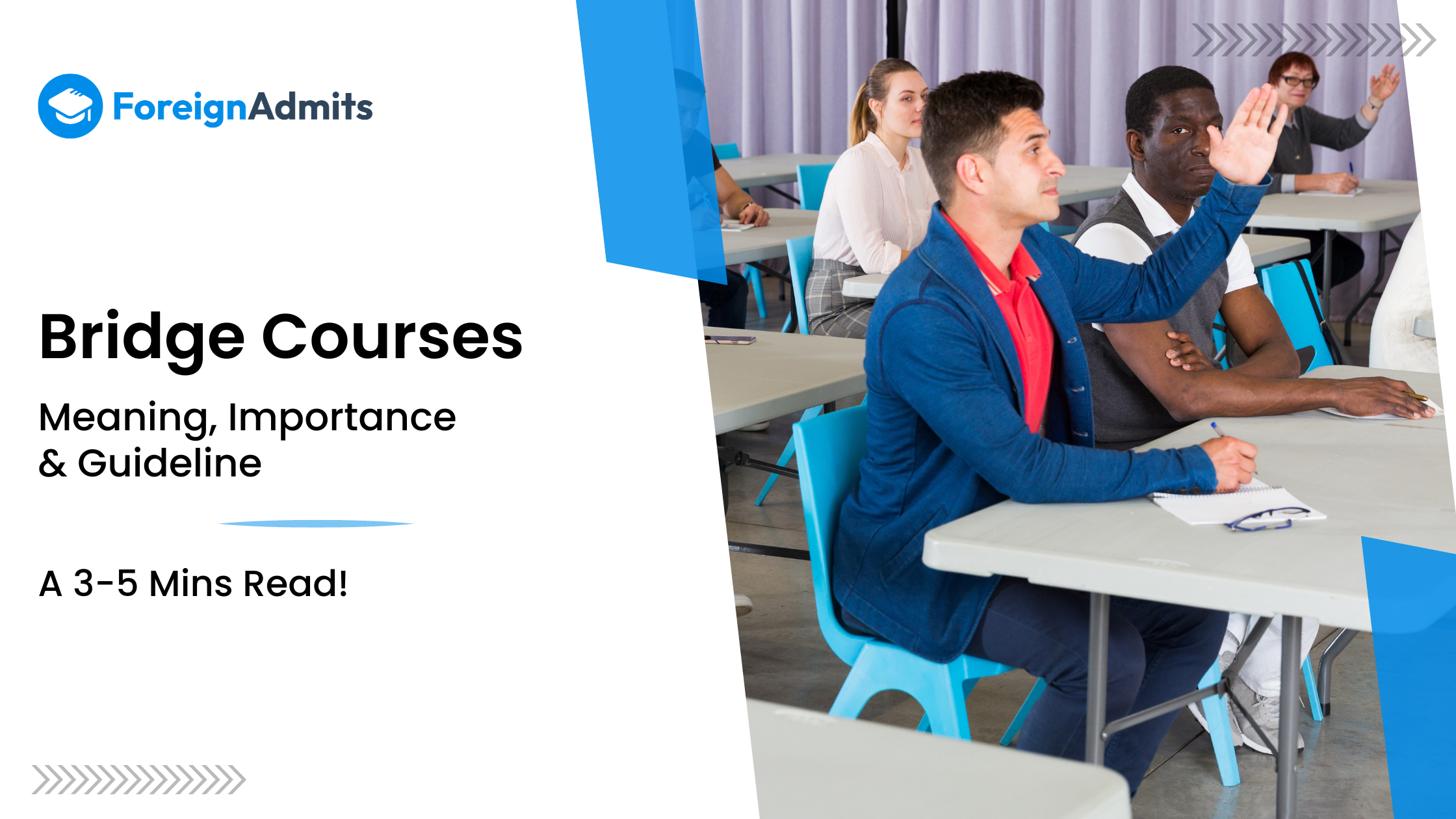Bridge Courses – Meaning, Importance, Guidelines (A Quick 2 Min Read)
Bridge Courses are preparation courses made by several universities throughout the world. They are linking courses that link a student’s introductory course. Moreover, the course the students want to join. Hence the student does not have to start from the beginning of the course.
The student wants to take, which is different from the course he is presently pursuing. Additionally, Bridge Courses can serve as an entrance exam for some colleges.
[widgets_on_pages id=”Resumes”]
What Are Bridge Courses?
Bridge courses are supplemental knowledge given to students. Further, they deliver them with an elementary understanding of the advanced subjects that will teach them in the future. A bridge course may lead a person to ensure that he has a basic knowledge of the course that will guide him.
It will ensure that the student does not have to complete the entire degree program in Information Sciences. It saves the student time, energy, and money.
Job Prospects in UK for International Students
How Can Students Take a Bridge Course
The bridging course allows the student to save a couple of years of crucial time before deciding on a subject. A student of art, for example, may wish to seek higher study in accounting or finance. They should consider the compulsory courses essential for accounting/finance. A typical practice in these will last a long time, causing the student to suffer significantly in their profession.
Bridge courses come into play as students can enroll in bridging courses. It comprises the fundamentals of bookkeeping, such as math, stocks, bonds, and so on, saving time and effort. Different organizations worldwide now consider bridge courses vital. This consideration is for hiring new students to get a fundamental understanding of the work.
The essentials and fundamentals of 10 + 2 level studies are necessary for easy comprehension of the subject. As a result, it becomes a component of the twelfth-grade and B.Sc. courses’ academic curriculum. The Bridge course serves as a resource for newcomers with specific goals. It allows them to continue with the in-your-face degree program.
Universities that give Fee Waiver for MiM in the UK
What Are the Objectives?
Bridge courses provide an adequate foundation in the core applied science subject. Hence students do not face any difficulties when college programs begin. This course offers a superior growth stage for students to get themselves up before starting the first semester.
They would concentrate on B.Sc. studies to overcome barriers between subjects taught at the pre-college level. Additionally, they will learn some of the topics in college previously.
The bridge course serves as a cradle for the new path. Before beginning the main year course, it will equip students with information. Furthermore, it will also provide certainty through interactive and dynamic learning.
Every Department is in charge of running its system by creating its syllabus. The bridge course is merely a starting point, not a destination. Institutions must follow up the bridge course regularly.
Best Cities to Travel to for Further Studies Post-Pandemic
Guidelines for Bridge Courses
Bridge courses should follow some standards for mature student application and admission. It has to reach the students over time-definite by the approving body. The content of the course instructional plan must be scholarly. The course should include college-level content and provide extensive instruction and practice in basic skills.
A course with a primarily non-scholastic educational plan, such as one designed to improve Basic English language abilities, will not be gone into a spanning study. This course incorporates non-scholarly arrangement as a subordinate or extra segment of the educational plan. It can still be classified as a consecutive course if the focus remains on educational topics for the necessary minimum term.
Grades must be on proven performance and indicate talents sufficient for college-level courses that need articles. A status of B or above is necessary to have the outcome seen with the purpose of confirmation.
Cambridge University MBA Scholarship 2022
What are the Benefits of Bridging Courses?
One can think of Bridge courses as valuable information. It can offer understudies to impart essential knowledge about the tough subjects that will teach them soon. A bridge course’s completion length varies from organization to organization.
But a bridge course generally lasts anywhere from a half year to a year. It is where bridging courses come into play, as students can enroll in courses in accounting fundamentals. Such accounting fundamentals are math, stocks, bonds, and so on, saving time and money.
[widgets_on_pages id=”In between blog CTA”]
Bridging Courses Approval
Successful completion of a university-preparation course must authorize bridge courses through the standard course approval process. One should do this in the Department, Faculty, or non-Faculty based institute conducting the study before admission. Only a university-preparation course that meets the conditions outlined in the following regulations should be made official.
The university should communicate any choices about accepting any university-preparation approach to Academic Standards, Curriculum, and Pedagogy. As a result, ASCP will be able to keep track of preferences and guarantee that Senate policy is searched for consistently. These are some details regarding bridge courses.
Do you have a question? Contact ForeignAdmits for further guidance on bridge courses.
Frequently Asked Questions
Q1. What precisely is a Bridge course in India?
Ans. The Bridge Course is intended to provide out-of-school youngsters with the option to participate in informal lessons as a bridge for one year into the regular education system.
Q2. Is the bridge course required?
Ans. Bridge courses are therefore very significant in a participant’s academic career, and it is critical that they follow them in order to have a better knowledge of their future possibilities and aspirations.
Q3. What are the advantages of a bridge course?
Ans. A Bridge Course is designed to assist individuals in transitioning from high school to university by strengthening academic abilities and understanding in writing, reading, mathematics, and science. These programs can also assist students in their preparation for certain topics such as nursing or engineering.
